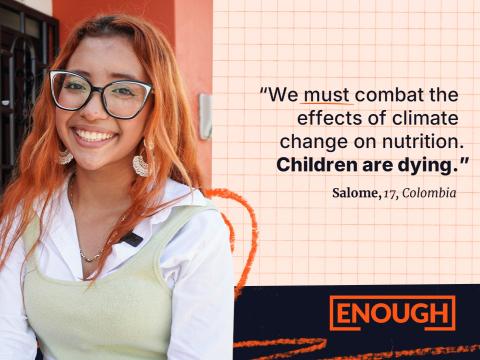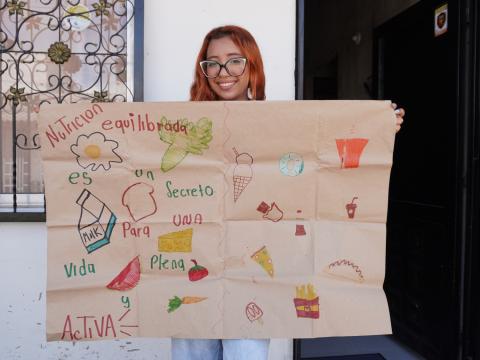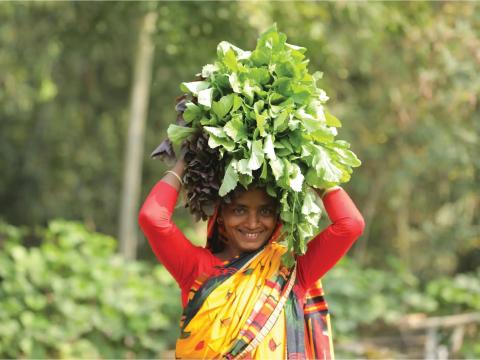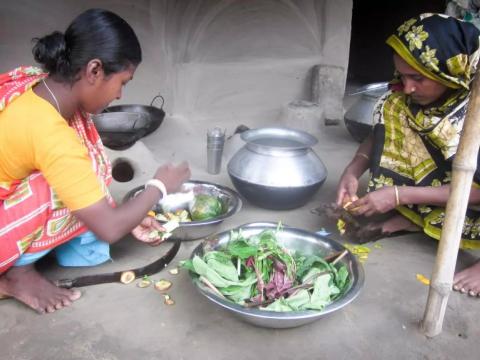
An essential right for the future of our generation and the planet
Salome, an ENOUGH young advocate attending this year’s Nutrition for Growth Summit, calls on world leaders to urgently address the crises related to food, nutrition, and climate change.
25 March 2025
My name is Salome, I am 17 years old, and I am an Environmental Leader from Colombia. Through my experience, I have come to understand that nutrition is not merely a health issue but an essential pillar for the integral development of girls, boys, adolescents, and young people, as well as for the sustainability of our environment. In various communities across Latin America, including mine, poor nutrition significantly affects the well-being of children, adolescents, and youth, limiting their potential and perpetuating cycles of poverty and inequality. Moreover, the environmental impact caused by our current food systems exacerbates the climate crisis, making it imperative to transform how we produce and consume food.
Proper nutrition is crucial for the physical and cognitive development of children and young people. According to UNICEF, in Latin America, one in five children under five years old experiences stunted growth due to malnutrition. In Colombia, it is estimated that nearly one million children are at risk of suffering from chronic malnutrition. This issue not only compromises their health but also negatively impacts their academic performance and future opportunities.
For adolescents and young people, maintaining a balanced diet is essential to sustaining the energy and concentration needed for studying and participating in community activities. However, many face obstacles such as limited access to nutritious food, in addition to the pressure of unhealthy diets promoted by the food industry. In my community, I have observed how the scarcity of fresh fruits and vegetables affects my peers, while ultra-processed foods are often the most accessible option.
Problems we face in our communities
Food insecurity is a highly complex issue in Colombia and Latin America. In our region, 188 million people do not have access to adequate food, representing 28% of the population. In my country, 15 million people live in conditions of food insecurity. This is due, among other factors, to poverty, inequality, and the high cost of nutritious food products.
Climate change also presents a critical situation. Extreme weather events such as droughts, floods, and extreme temperatures negatively impact agricultural production, limiting food availability, increasing costs, and affecting the quality and quantity of food. In Latin America, 74% of the population lives in countries exposed to extreme climate phenomena. In my own community, farmers are trying to adapt to this reality, which directly affects food production.
A call to world leaders at the Nutrition for Growth Summit
Alongside all that I have described so far, as a young person, I demand a strong response from world leaders to urgently address the crises related to food, nutrition, and climate change. This is what I am demanding:
- Promote sustainable food systems: Support local and sustainable agriculture, reduce food waste, and foster research on climate-resilient food production systems. These measures will ensure cheaper and more accessible food while contributing to reducing greenhouse gas emissions from food production.
- Invest in food education programmes: Implement programmes to teach communities the importance of maintaining a balanced diet and how to access healthy foods sustainably.
- Ensure access to nutritious food: Governments must implement policies that subsidise healthy food (and regulate ultra-processed products), especially for children and young people.
- Take necessary measures to address the climate crisis: World leaders must uphold the commitments of the Paris Agreement and support financing initiatives to mitigate the effects of climate change on agriculture and food security.
- Achieve the Sustainable Development Goals (SDGs): Particularly SDG 2, which aims to eradicate hunger and ensure food security and nutrition by 2030. Without concrete efforts, this SDG remains just a dream.
A sustainable future for all
Nutrition is not just a health issue; it is a human right and an investment in the future of our generation and the planet. As a young person, I have the responsibility to raise my voice and demand change at the Nutrition for Growth Summit in Paris. But we need the support of world leaders, communities, and businesses to build a fair, sustainable, and resilient food system.
We cannot allow poor nutrition and climate change to continue stealing the future of millions of children and young people in our region. Together, we can ensure that everyone has access to nutritious food and that our planet can sustain future generations.
It’s time to act!
ENDS
Learn more about World Vision’s attendance at the N4G summit.
Children and young people are calling for Governments to listen to their concerns, experiences, and solutions to malnutrition. World Vision stands alongside these incredible young leaders. Stand with us.
Salome is a 17-year-old Environmental Leader from Colombia. She is one of World Vision’s ENOUGH young advocates attending this year’s Nutrition for Growth Summit in Paris.
REFERENCES:
- Fondo de las Naciones Unidas para la Infancia (UNICEF). (s.f.). Crisis alimentaria en América Latina y el Caribe: Un reto urgente para la infancia y las familias.
- Programa Mundial de Alimentos (PMA). (2023). El impacto del cambio climático en la seguridad alimentaria de América Latina.
- Organización de las Naciones Unidas para la Alimentación y la Agricultura (FAO). (2022). Panorama de la seguridad alimentaria y nutricional en América Latina y el Caribe.
- Departamento Nacional de Planeación (DNP) de Colombia. (2023). Análisis de la inseguridad alimentaria en Colombia.
- Naciones Unidas. (2022). Objetivos de Desarrollo Sostenible: Hambre Cero.
- Alarmantes cifras de desnutrición crónica en Colombia | KienyKe.
- Seguridad alimentaria y nutrición, temas de la cumbre de expertos en Colombia.
- América Latina pierde la lucha contra el hambre: 188 millones de personas no consumen los nutrientes necesarios.


